| 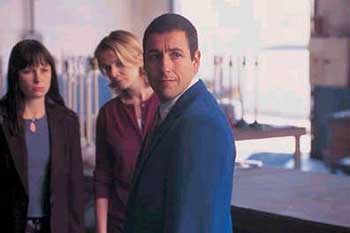
On Punch-Drunk
Love
by Tom Smith
In this
essay I shall explore certain psychological underpinnings
- primarily those relating to family, its dysfunctions, and
variants on the near-universal desire for acceptance within
society - central to an appreciation of the seriocomic oeuvre
of writer-director Paul Thomas Anderson, and his unheralded
2002 romantic ode Punch-Drunk Love. Employing Russian
post-formalist philosopher Mikhail Bakhtin’s notion
of the carnival (with its inherent, roiling galleries of grotesques)
as a locus of “dialogical” imagination, and with
a respectful nod to French psycholinguist Jacques Lacan and
his “split-subject” formulations, clues to divining
Anderson’s diligently non-ironic, shamelessly fervid
aesthetic will be examined. To Bakhtin, the carnival represented
an oscillating field braided within the triggers of anti-hierarchical
charges which blasted through formal narrative orthodoxies.
Juxtapositions and incongruities thus lay shattered, lacerated;
midway funhouse mirror shards fragment an already distorted
social order. To Anderson, sudden, miraculous and fateful
intrusions are a matter of perverse course. Fate is itself
a character, and reason is its frequent bumbling foil. Within
this exhilarating milieu – one which resonates with
petulant, forceful intertextuality – a careful reader
might also identify at least one of the reasons why P.T. Anderson
would likely assail this introduction. (He rejects formal
critique.) His prose is discolored, livid, and his direction
seeks not the soul of the actor or the fathoming of the depths
of their emotions but a mine-sweeping of the hidden ticks
that mask or seek to draw attention from collective anxieties
and prosaic truths so steeled and grounded that they almost
completely repulse critique. Through these graceful labors
he presents a portrait of humanity at once at odds and in
love with itself. His characters yearn for completion, forever
seeking approval. Their discourse is constantly interrupted,
and external diegesis is similarly fractured. This is good.
Dialogue is seldom linear, and less often punctuated by the
profound. Anderson’s skills as a screenwriter are formidable
– given the blithely dysfunctional nature of his protagonists
(Phillip Baker Hall’s grizzled, sentimental gambler
in the little-seen Vegas neo-noir Hard Eight, Mark
Wahlberg’s damaged, delusional, and risibly pragmatic
porn star in Boogie Nights, Tom Cruise’s grimly
clinical self-help guru in Magnolia, and Adam Sandler’s
browbeaten, emotionally paralyzed nebbish in Punch-Drunk
Love), he deftly eludes narrative mawkishness while imbuing
his avatars with a knowing, thoroughly rooted melancholy.
His creations characteristically lament their too familiar
post-modern ills (disassociation from home and hearth, anomies
induced both by hard living and conscious, reckless disregard
of their better interests), but in the process of inhabiting
the roles demanded of Anderson’s dystrophic sideshow
they manage to exude extraordinary heat and suffuse banalities
with gleeful, sometimes shockingly non-subversive humor. That
is to say, the subversions of irony and transgression have
wizened, grown stale. Anderson winked along with us during
sections of Boogie Nights, true, but with the elegiac
Magnolia and the sublimely concise Punch-Drunk
Love he learned not only to pull his best punches but
to toss the gloves, the medicine ball and the cursed ring
itself into the incinerator. Such Olympian sleight-of-hand
demands more than cursory analysis; in this examination Lacan’s
unconsciously bifurcated “split-subjects” –
distorted by the forces of libidinal energy and unfettered
repression – can perhaps be overlaid as a corrective
gridwork to better focus the aims of this inquiry.
No subject
was ever so split as Punch-Drunk Love’s Barry
Egan.
There
have been sundered characters throughout the history of comedic
cinema; most often they are routinely limned avatars, rarely
cognizant of either their formidable nescience or the force(s)
which conspire or conjoin to catapult them to such pitiable
emotional redoubts.
Barry
Egan is only too aware of his predicament. He is recognizable;
he is not a cipher. His pains are medieval humors, and his
passions woeful, desanguinated vanities. Fully realized, he
is almost unutterably repressed. Anderson’s screenplay
is a marvel of concision, a human genome sequence etched and
caricatured on the blunt edge of a Post-It pad. Egan is honorable,
despite dishonors endured. His thrift and apparently limitless
diffidence abuts in jolting opposition to his sisters’
brute fecundity and unrestrained, unreasonable hostility.
It is not surprising then that Emily Watson’s Lena Leonard
conducts a campaign of aggressive subterfuge to dismantle
Egan’s emotional fortifications. In the spiral(ing)
universe of Punch-Drunk Love, family is both the
locus of the malign and the whole cloth from which samples
of a slightly less horrendous future are spun. Familial chaos
is a recurrent theme in Anderson’s films – bonds
are viscous, rheumy, something grey-green and unsavory at
the back of one’s throat. Love is an overdose, a suicidal
everyman on the dull cusp of infinity; family is a bored hotline
operator dozing between abyssal howls. And love, thankfully,
is hallucination. Family, thoughtfully, is a rickety rope
bridge tethered between hopelessness and septic self-absorption.
Crawling, recoiling from the wreckage of juxtaposition, Barry
Egan’s first instinct is to flee screaming through the
streets of a bleak San Fernando Valley suburb.
His desires
wrested from one, appalling representation (that imposed on
him by his sisters) to another, equally foul but far less
accommodating refraction (perceived through the bleary, unblinking
eyes of the quadruplet thugs), Egan endlessly oscillates from
repressed walking mania to obliterative psychosis. Each under-saturated,
overfed frame of Anderson’s sordid, honey-flecked oeuvre
depends, turns on the liberating arrival of a deus ex machina
to provide swing, soul, to lift the hem of Lady Luck’s
skirt and distract Death from banal toil. In Hard Eight,
Sydney is the God-Machine, a shark-skinned golem with a soft
spot for the numbed and regretful and no compassion for the
unequivocal. There is little humor in the film, and little
that reeks of humorlessness. It is predicated on the application
of a healing unguent – melancholy, stripped of mawkishness
or trivial subversion – to the spirits of the comically
hopeless. In Egan’s rapacious disengagement we find
disturbing, salubrious parallels. In Boogie Nights,
Eddie Adams’ outsized penis is Allah, a god removed
from machinery, God made flesh, God stumbling toward an inane
fate of lubricious annihilation. Each character in Anderson’s
exquisitely wrought – and often side-splittingly risible
– screenplay is activated or stilled, caramelized or
obliquely defamed by the notion of phallus as psychic liberator.
Sexual transcendence seems the least likely result of the
salty labors of Jack Horner’s extended porn family –
such reveries are eternally reserved for private retreats.
In Magnolia, a literal rain of frogs suspends narrative,
slashing through characterization with the offhand torpor
of a bored god gone to seed. Supplications are fixed within
amphibian slime, scraped from the asphalt, and discarded.
God, in Magnolia, is a resin, a receptacle, a placenta.
Barry
Egan’s prayers, conversely, are pitched to the incorporeal,
into nothingness itself. The distorting shards of the funhouse
mirror reflect a doleful sap occluding hair-trigger horrors
and split, with nature’s abrupt, punch-drunk trepidation,
into primary, Bakhtian character colors: the slurred grey-greens
of the tout, the salmon pinks and wood-paneled browns of the
geek, and the weeping ochres and flaring cobalt blues of the
human pin cushion. Egan’s equally fractured sense of
self-control can be traced, in reverse Andersonian chronology,
to the raffish, palpitant yearnings of the adult Donnie Smith
in Magnolia, to the tragic insouciance of Amber Waves
in Boogie Nights, and to the ill-fated John, a character almost
wholly adverse to the lure of the rational, in Hard Eight.
It’s an extraordinary lineage. John is impelled to broker
poisonous alliances, Amber is cajoled by a comforting stasis,
and Donnie loses his teeth in a witless bid to catch the eye
of a mannequin. Barry, no less flawed, prefers the peripheral
to the subjective, simulacra to viscera. As the oddly alluring
Lena Leonard walks away from Egan’s warehouse redoubt
following an initial, jittery encounter, director Anderson’s
camera frames actress Emily Watson in the center of a bleached,
compressed tableaux. The morning sun flares in the top right
corner, while broad, diagonal shadows streak across asphalt,
contrasted aggressively by white warehouse walls. Lena’s
threadbare Geo Metro coupe draws one’s gaze, centering
perception as might five pounds of raw whale blubber at the
pin reset gate of a suburban bowling alley. The scene quivers,
jostling the senses. And then you are given the provocation,
the upended railway carriage, a rain of falling spikes: Lena/Watson’s
derriere, a fulsome, womanly ass, suffused with an
erotic charge equivalent to, or at least capable of utterly
obliterating, each tic, twitch and self-abnegating reflex
in Egan’s armory of grief and defeat. In her red skirt,
pink blouse, and dirty blonde hair, lashing through the frame
in bold, swaying, emollient strides, Lena absorbs the heat
of the sun, sucks the glare from the sky. Barry is reduced
to idiocy, to a cooing, drooling cipher, a zero quantity,
subjugated, distilled. Through Lena’s inexplicable largesse,
Egan receives a new lease, or at least an option to fritter
away a down payment on a new lease. Here, despite gurgling
subtexts, Adam Sandler portrays Barry Egan with astonishing
nuance; the relinquishing of control that the actor had been
perceived as having endured during the making of the film
seems in retrospect all too canny a PR conceit, a sort of
neuro-cortical feint. Arc, process and product may be similarly
measured, and are ultimately mirrored, in the giddy,
luxuriantly naked performances Anderson extracts from his
leads. Unsurprisingly, Punch-Drunk Love is the most
sexually potent film of the director’s still-nascent
oeuvre. It reeks of the erotic. Boogie Nights,
after all, was the story of a family of pornographers, of
a clan wed to representation. Punch-Drunk Love is,
as advertised, an exegesis of the emotional slipstream, an
ode to the precariousness of flesh, to Cupid’s perfidy.
In Nights, Amber Waves remains in flux, in amber,
narcotized in familial embrace. Egan and Leonard, conversely,
are repelled by family, adrift, unbound. Lena strikes hard,
repeatedly, unceasingly, to penetrate Barry’s defenses.
Egan is the soft underbelly, a sun-bleached patio bean bag,
a 100-pound sack of flour. His resistance is as immutable
as his desire to be exhumed; thus, another portrait of flux
emerges, but one less tied to resignation, to exculpatory,
voyeuristic balm. Barry wants out, but flinches from the touch
of his rescuer. The violence expressed by Leonard and Egan
in the moments prior to their lovemaking in a Hawaiian hotel
room is, in tone and color, analogous to the first, pincer-like
movements of a dervish dance, an azure tarantella performed
by absinth-addled clerics and passed down to giddy novitiates
of a Sardinian erotic order. Their words have heft, sufficient
spittle, but sway, jolted from menacing axes. Bathed in whites
and blues, swept up in bold brushstrokes, they slash across
the constricted frame. Mock aggression is buttressed by a
collective understanding that these characters have known
great pain. Violence is the vector through which pleasure
may intrude, mollify. Humor, however inappropriate or unintentional,
abuts into the processed decorum of everyday reality as a
reaction to stimulus. The more acute (or traumatic) the circumstance,
the more mordant and unhinged the comic impulse must necessarily
be. Cut again to Lena and Barry’s pre-coital aria and
we are dumbstruck, hypnotized
BE:
(shaking his head side-to-side after kissing Lena) I’m
sorry I forgot to shave.
LL: Your face is so adorable, and your skin and your cheek
and… I want to bite it. I want to bite your cheek and
chew on it, it’s so fucking cute.
BE: (looking for the words, then whispering) I’m lookin’
at your face and I just wanna smash it. I just wanna fucking
smash it with a sledgehammer and squeeze it, you’re
so pretty.
LL: (becoming more aroused) I wanna chew your face and I wanna
scoop out your eyes and I want to eat them. Chew them and
suck on them.
BE: Okay…
Anderson
connects his familial patchworks with sutures of born of deep
regrets, of primal opprobrium. He understands the necessity
for noir to provide no succor for its protagonists
save the acknowledgement that they have indeed survived, have
tasted the hurts and horrors that propel, ignite, and fan
the human conflagration. Sydney, John, and Clementine from
Hard Eight emerge with little, save their skins (which
they likely first purchased from a suburban Vegas strip mall
pawnbroker) from the fire. Amber, Eddie/Dirk, Jack and Rollergirl
from Boogie Nights scavenge dignity (however normatively
blunted) and bruised purpose from the inferno. That the filmmaker
steadfastly refuses to pass judgment on the extended Horner
clan only serves to deepen the melancholy that burns through
the film. Linda, Donnie, Claudia, Frank and Jim from Magnolia
are more obtrusively disconnected from their traumas than
previous Anderson protagonists, but the arc of their salvation
and awakening (especially pertinent in Linda and Frank’s
painful resuscitations) is leavened (but not diminished) with
an almost irascible absurdity. Punch-Drunk Love,
however, is direct, unequivocal, an aesthetic insurgent’s
pipe bomb tossed between the gears of our collective emotional
machinery. Throughout Anderson’s liver-spotted oeuvre,
comedy splits from pathos, is reflected via melancholy into
prismatic absurdity, and bends back onto itself as light is
subdued by more powerful gravitational forces. His characters
live within oscillating skeins of burnished reflexivity, and
huddle together both in the moth-eaten recesses of carnival
caravans and amid the artful clutter of less humble dwellings.
Apartments scream, cars weep, and harmoniums bray, while human
characters gaze wistfully into voids of their own conjuring.
P.T. Anderson’s comic impulse takes the form of a scab-like
saucer and careers through the corridors of thematic conceits,
scuffs and abrades their faux-finished surfaces, and sends
both the lunatic and the tragic into a centrifugal whirl.
Carnival and catastrophe merge, seamlessly, infusing protagonists
with extraordinary depth, nuance, and visceral élan.
(Yes, even those portrayed by the likes of Adam Sandler.)
Punch-Drunk Love is, for now, the apex of Anderson’s
creative arc.
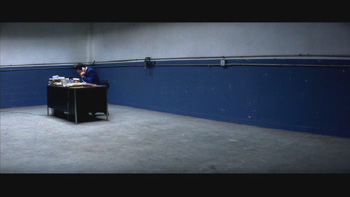
"Fully realized, he is almost unutterably
repressed."
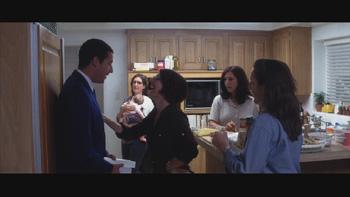
"His thrift and apparently limitless diffidence
abuts in jolting opposition to his sisters’ brute fecundity
and unrestrained, unreasonable hostility."
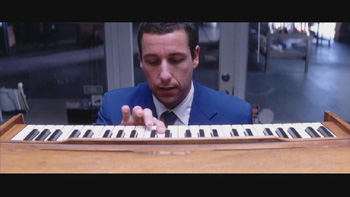
"Barry
Egan’s prayers, conversely, are pitched to the incorporeal,
into nothingness itself."
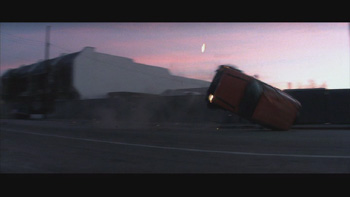
"To
Anderson, sudden, miraculous and fateful intrusions
are a matter of perverse course."
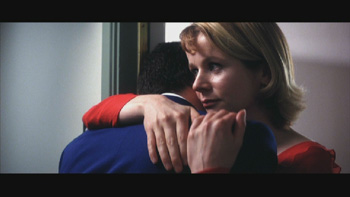
"His
characters yearn for completion, forever seeking approval.
Their discourse is constantly interrupted, and external diegesis
is similarly fractured."
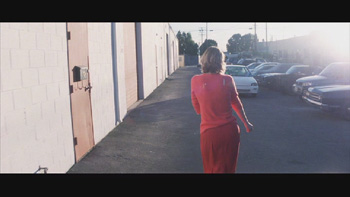
"And
then you are given the provocation, the upended railway carriage,
a rain of falling spikes: Lena/Watson’s derriere, a
fulsome, womanly ass, suffused with an erotic charge
equivalent to, or at least capable of utterly obliterating,
each tic, twitch and self-abnegating reflex in Egan’s
armory of grief and defeat."

|